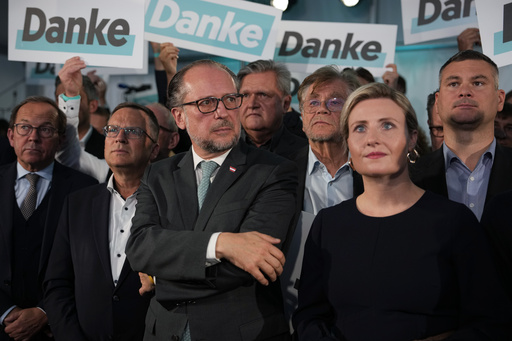
VIENNA — The atmosphere in the Austrian capital was somber at the beginning of August, with countless devoted fans of Taylor Swift, often referred to as Swifties, exchanging friendship bracelets, donning glittering dresses, and singing her songs in the streets of Vienna. This vibrant scene contrasted sharply with the actions happening behind the scenes, as workers dismantled the stage where Swift was scheduled to perform. The abrupt cancellation of her three concerts came after authorities received credible threats of an attack linked to Islamic State militants.
Austrian and U.S. officials have acknowledged that a vital exchange of intelligence helped avert a potentially tragic event. However, such collaborative efforts hinge on a foundation of mutual trust — a necessary assurance that sensitive information will not be misappropriated or disclosed to adversarial governments. Over the past few weeks, anxieties have risen among Austria’s Western allies regarding this very risk, particularly as the political environment evolves. For many years, Austria’s political parties have exhibited a level of openness towards Russia, a stance rooted deeply in a long-held policy of neutrality. None has embraced this more than the far-right Freedom Party, which recently emerged as the dominant force in the national elections.
Should the Freedom Party form part of Austria’s next government, experts have raised concerns about a significant tightening or total cessation of intelligence-sharing agreements. As of now, the center-right People’s Party is designated to attempt to establish a governing coalition, with negotiations pending in the coming weeks and months. The Freedom Party is excluded from these discussions, as both the conservatives and other parties have unanimously ruled out collaboration with the far-right faction. However, if these coalition talks falter, the Freedom Party stands ready to step in.
Authorities from both Austria and the U.S. have stressed that information-sharing is crucial in preventing threats like the one that led to Swift’s shows being canceled. This collaboration involves a deep-seated trust, especially where relations with Russia are concerned. Historical context is important here, particularly remembering the 2018 incident when Herbert Kickl, then leader of the Freedom Party and Austria’s interior minister, oversaw a controversial police raid on domestic intelligence offices. This left many foreign intelligence services hesitant to share information with Austria.
The fallout from this illegal raid, later deemed unlawful by an Austrian court, has prompted ongoing investigations and discussions. Speculation surrounds possible Russian influence behind the events of 2018, with claims that Kickl and his party could have inadvertently aided Russian interests. It was suggested in May by Beate Meinl-Reisinger, head of the liberal Neos party, that the Freedom Party either knowingly facilitated Russia’s agenda or acted as naive enablers.
The inquiry into the raid revealed that members of the Ministry of Interior, under Kickl’s leadership, had utilized a clandestine dossier to push prosecutors towards sanctioning the raid. The allegations contained in this document soon vanished amid the investigation’s aftermath. Still unclear is the identity of the individual responsible for compiling and leaking the information; speculation includes a former intelligence agent who may have acted out of frustration with the agency.
The repercussions of the raid continue to resonate, with German lawmakers expressing intentions to reevaluate cooperation with Austria should the Freedom Party gain influence in the forthcoming administration. In light of the pressing risks that Russia poses to stability across Europe, officials emphasize the need to prevent valuable intelligence from falling into Russian hands.
Debate continues concerning the Freedom Party’s relationship with Russia, particularly as it publicly advocates for an end to sanctions against the nation. Their critical stance towards Western military assistance to Ukraine and previous agreements with Putin’s party raise further questions surrounding their influence on national security policy.
Austria’s historical context plays a significant role in this situation. Following World War II, the nation adopted a stance of neutrality while fostering diplomatic relations with various powers, including Russia. This openness has rendered it a significant hub for foreign espionage operations. While espionage against Austria is explicitly prohibited, activities directed at other nations or organizations are not, creating a complex web of vulnerabilities.
In the wake of increasing tensions, Austria has expelled a select number of Russian diplomats suspected of espionage; however, the overall number remains alarmingly high. Reports hint at a large presence of individuals possibly operating undercover within diplomatic ranks. Critics assert that the Austrian government should take more decisive action against Russian espionage to address security concerns effectively.
In its annual report, Austria’s domestic intelligence agency has pointed out the growing espionage threats, drawing attention to the use of sophisticated surveillance capabilities by Russian diplomats in central Vienna. Their operations pose a risk not only to Austria but also to broader regional security interests.
Looking ahead, many anticipate that rising tensions with Russia will continue to overshadow Austria’s political landscape, regardless of which party ultimately assumes power in the government. The long-standing ties between Austria and Russia complicate the prospect of future collaboration with allies and may hinder progress in strengthening security measures across Europe.
